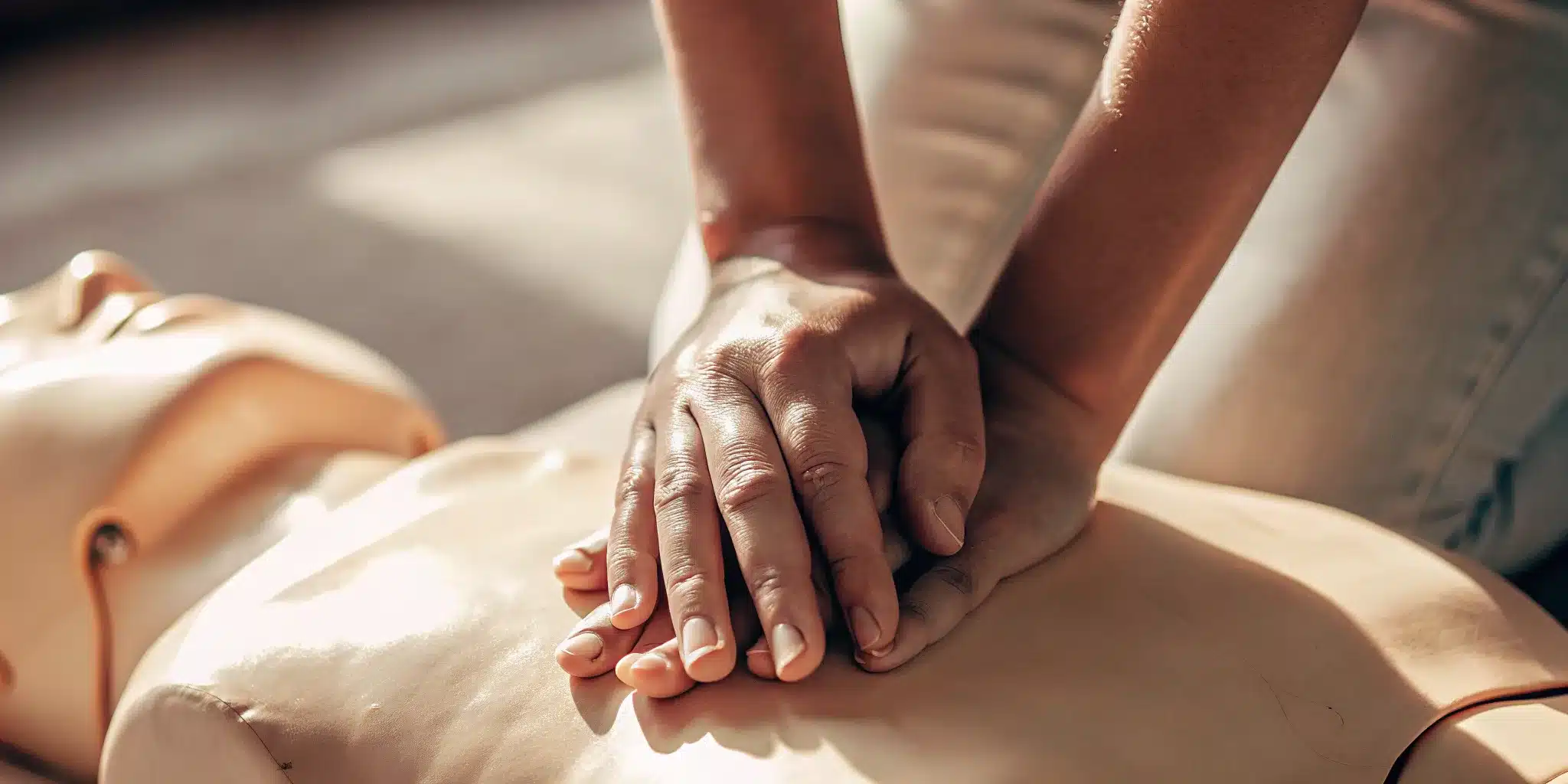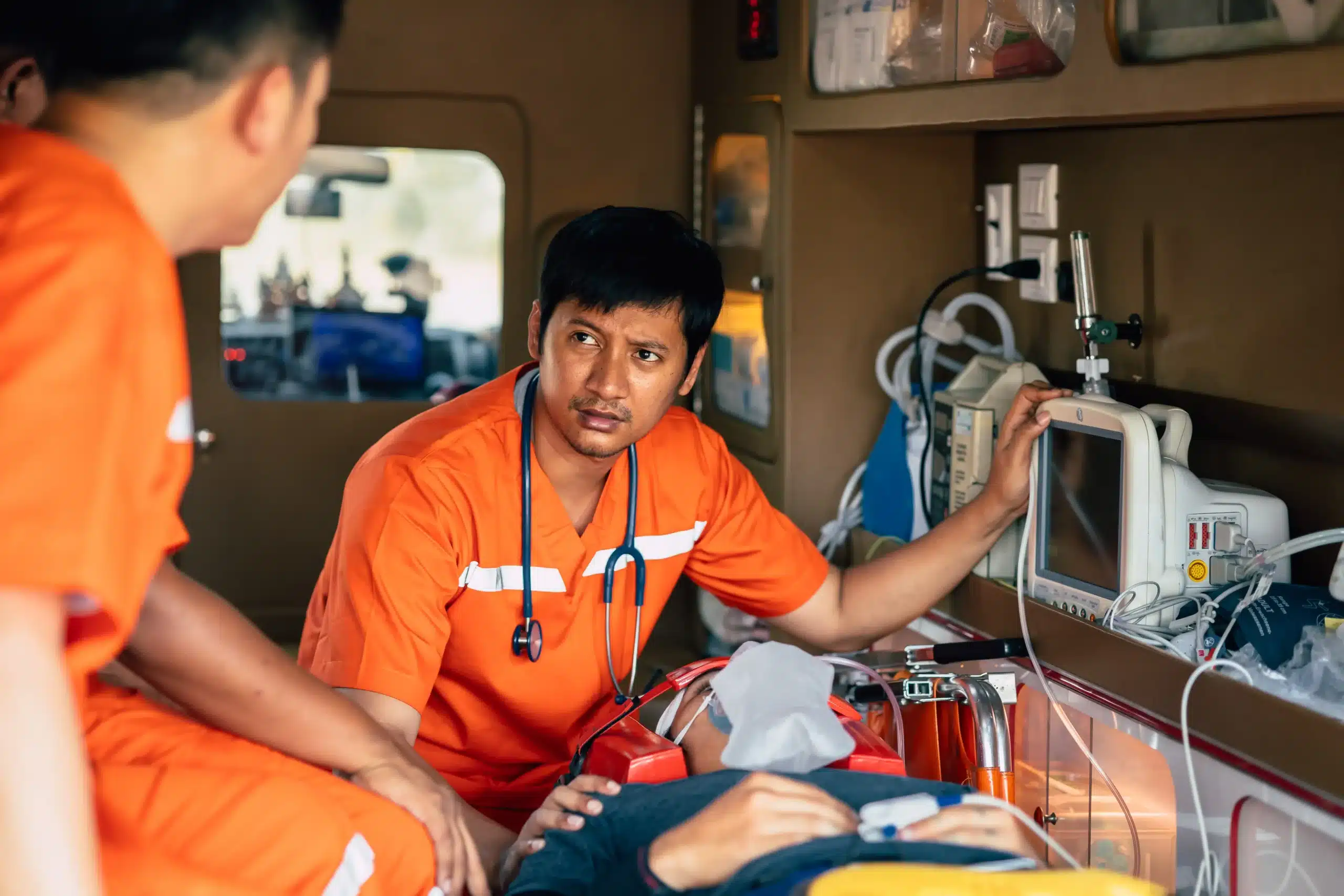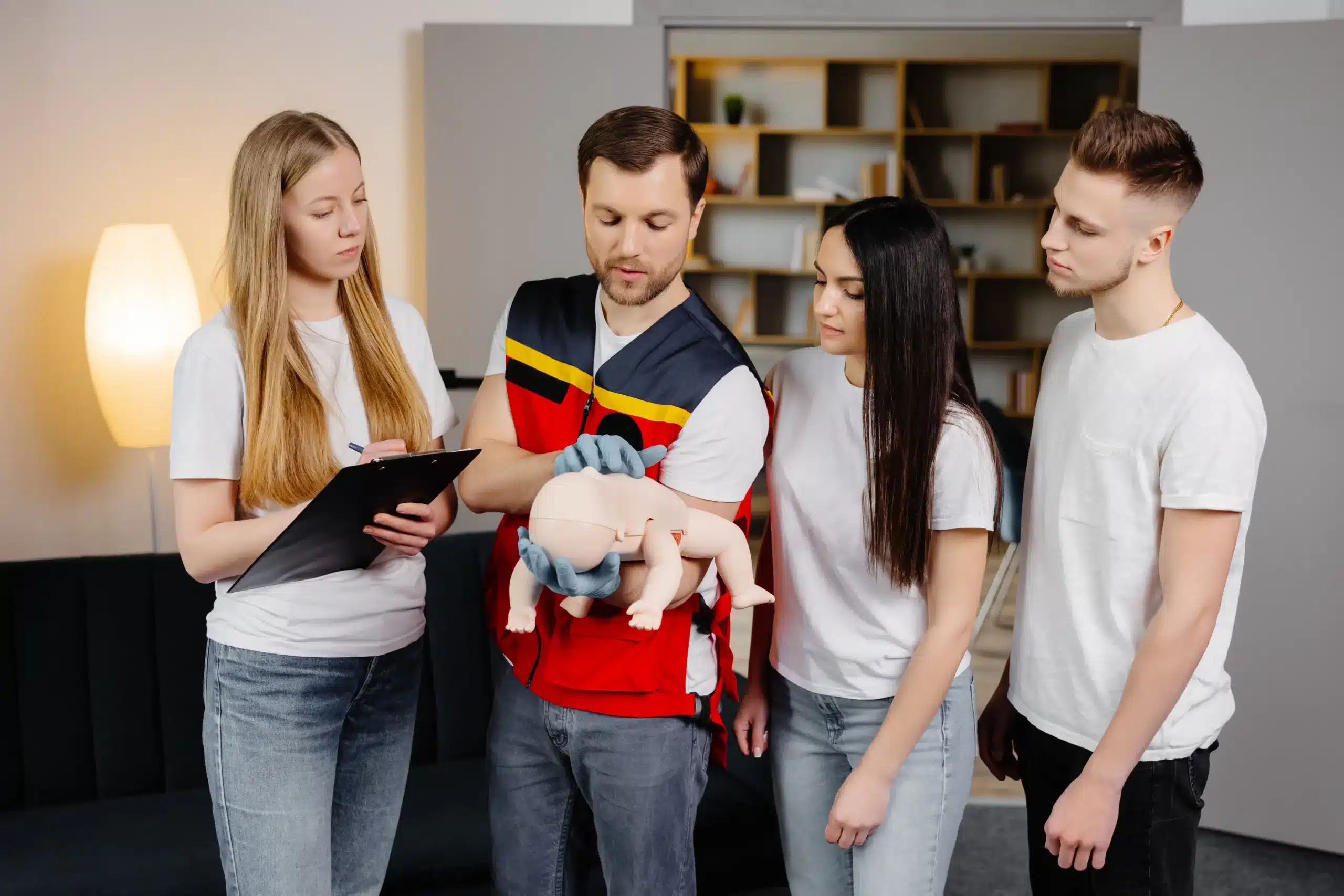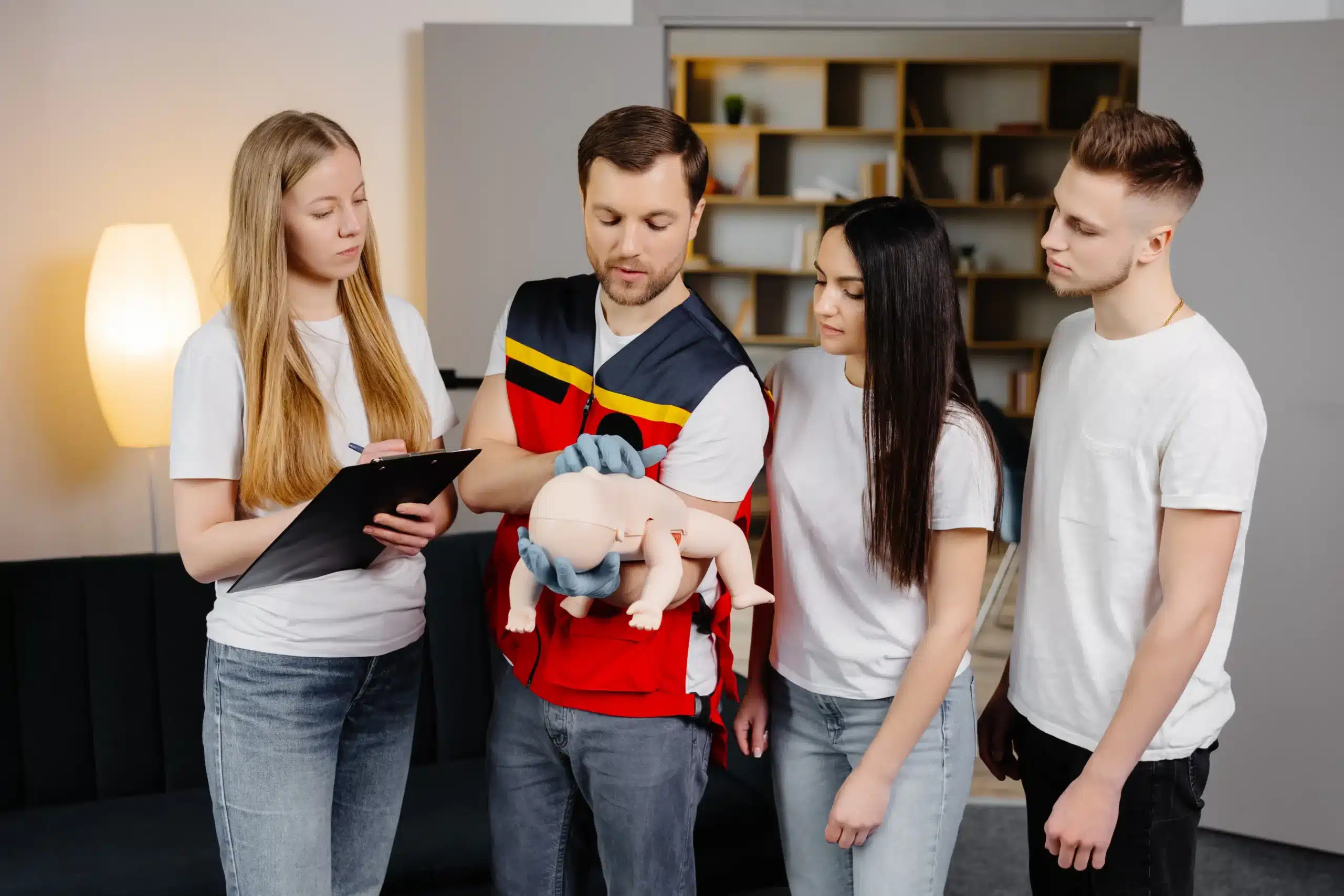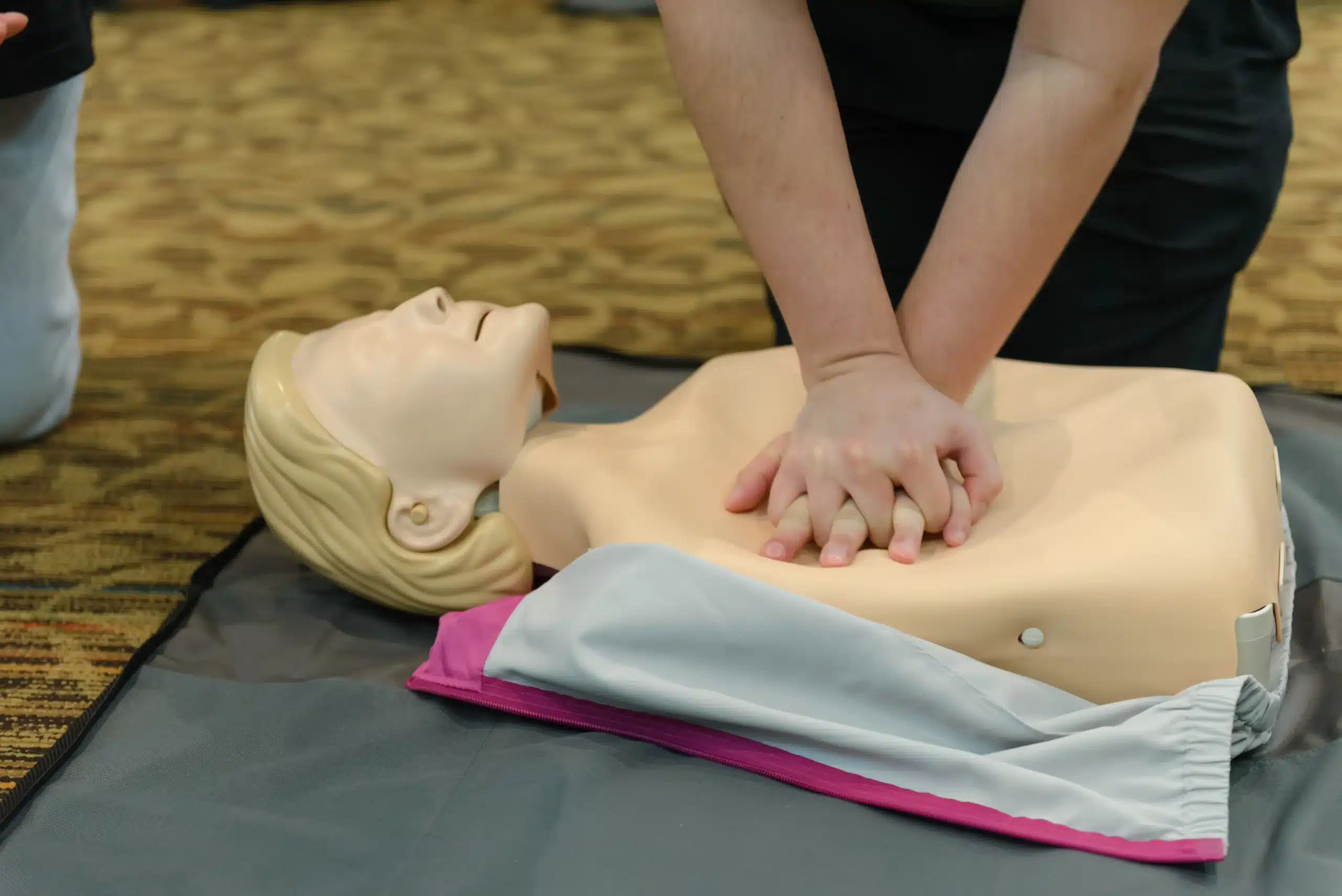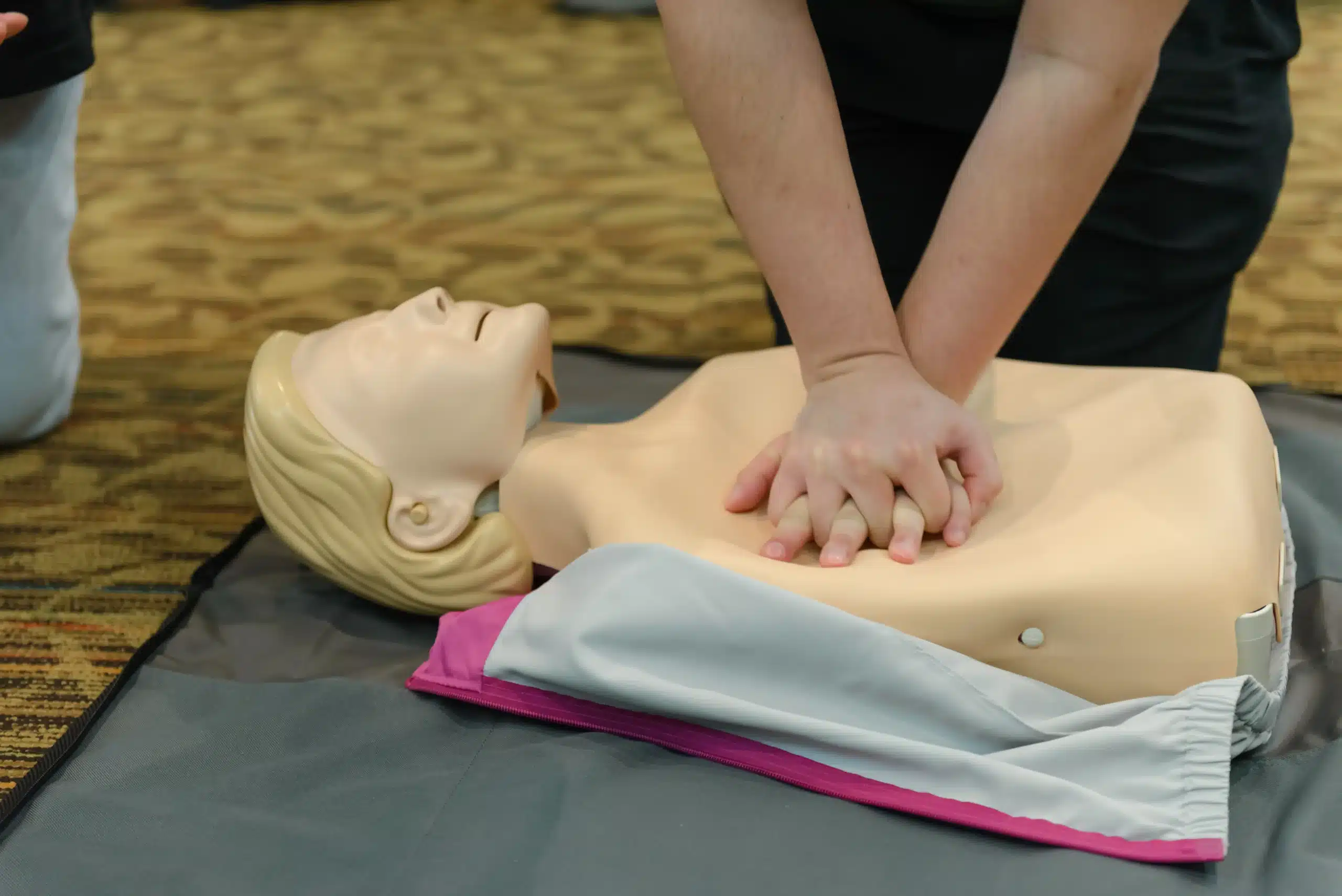Emergencies can happen anytime, anywhere. Being prepared to respond effectively is a crucial skill, and CPR training empowers you to make a difference when every second counts. Finding the right CPR classes in Daly City can feel overwhelming, but this article simplifies the process. We’ll explore the different types of CPR certification, discuss the costs and benefits of training, and provide resources to help you find convenient and reputable CPR classes in your area. From debunking common myths to understanding the certification process, this guide equips you with the knowledge and confidence to become a prepared and effective lifesaver.
Key Takeaways
- CPR skills empower you to make a difference: Equipping yourself with CPR training enables you to respond confidently to emergencies and potentially save lives within your community. Find a class that suits your needs, whether for professional requirements or personal preparedness.
- Affordable and accessible CPR training is readily available: Providers like Safety Training Seminars offer various courses, including BLS, ACLS, PALS, and RQI, at convenient locations and competitive prices. Explore their website for course details and schedules.
- CPR certification is easy to obtain and maintain: Many training centers offer same-day certification. Remember to renew your certification every two years to stay current with the latest guidelines and maintain your lifesaving skills.
What is CPR and Why is it Important in Daly City?
Cardiopulmonary resuscitation (CPR) is a lifesaving technique used in emergencies when someone’s heartbeat or breathing has stopped. It involves chest compressions and rescue breaths to circulate oxygenated blood to the brain and other vital organs until professional medical help arrives. Learning CPR empowers you to make a real difference in a critical situation. In a place like Daly City, with its diverse community and various potential emergency scenarios, knowing CPR is an invaluable skill. Time is of the essence during a cardiac arrest, and immediate CPR can significantly improve the chances of survival.
Debunking Common CPR Myths
Several myths surrounding CPR can prevent people from taking action. Let’s clear up some of these misconceptions:
- Myth 1: CPR always revives someone. CPR helps maintain blood flow to vital organs, buying precious time until paramedics arrive, but it’s not a guaranteed fix. Richmond Training Concepts discusses this misconception and emphasizes the importance of understanding CPR’s realistic outcomes.
- Myth 2: CPR is only for healthcare professionals. Anyone can and should learn CPR. Equipping yourself with this skill means you can assist family, friends, coworkers, or even strangers in an emergency. This article dispels common CPR myths, highlighting the importance of widespread CPR training.
- Myth 3: Performing CPR can lead to legal trouble. Good Samaritan laws generally protect those who offer aid in emergencies. The focus is on helping someone in need, and these laws encourage bystanders to act without fear of repercussions. Learn more about Good Samaritan laws and CPR.
Benefits for Non-Healthcare Professionals
Learning CPR offers significant benefits, even if you’re not in the medical field:
- Increased Confidence in Emergencies: Understanding CPR builds confidence and reduces hesitation in critical situations. Knowing you can provide immediate assistance can make all the difference.
- Improved Outcomes in Cardiac Arrest: Hesitation due to CPR myths can have serious consequences. By being CPR-trained, you can directly contribute to positive outcomes during cardiac arrests. This blog post discusses the impact of CPR knowledge.
- Empowerment to Save Lives: Learning CPR empowers you to potentially save a life in your community. Being trained allows you to act quickly and effectively, making a real impact in Daly City. Learn more about the importance of CPR training.
CPR Classes in Daly City: What Are Your Options?
Choosing the right CPR class can feel overwhelming with so many options. This section breaks down the different types of CPR certification courses available in Daly City, helping you find the perfect fit.
Basic Life Support (BLS)
Basic Life Support (BLS) classes are the cornerstone for anyone in healthcare. Often required for professionals like doctors, nurses, and paramedics, these BLS certification courses equip you with the skills to respond to life-threatening emergencies. BLS covers high-quality CPR, emphasizing chest compressions, rescue breaths, and teamwork during critical events. It also includes AED (automated external defibrillator) training. Classes typically run between four and eight hours, depending on the format and provider.
Advanced Cardiovascular Life Support (ACLS)
Advanced Cardiovascular Life Support (ACLS) certification goes a step further than BLS. Designed for healthcare providers involved in managing cardiopulmonary arrest and other cardiovascular emergencies, ACLS builds upon the fundamentals of BLS. This course covers advanced airway management, pharmacology in emergencies, and effective team dynamics during resuscitation. ACLS certification is crucial for those in critical care, emergency rooms, and intensive care units.
Pediatric Advanced Life Support (PALS)
Pediatric Advanced Life Support (PALS) focuses specifically on the emergency care of infants and children. This course gives healthcare providers the knowledge and skills to assess and manage respiratory and cardiac emergencies in younger patients. PALS covers pediatric-specific CPR techniques, airway management, and recognizing signs of serious illness in children. It’s a vital certification for pediatricians, pediatric nurses, and other professionals working with children.
Heartsaver CPR and First Aid
Heartsaver courses are perfect for those outside of healthcare who want to learn essential lifesaving skills. Heartsaver CPR and First Aid training teaches basic CPR and first aid techniques for responding to common emergencies like choking, heart attacks, and strokes. These courses are often required for teachers, coaches, childcare providers, and workplace safety officers. They’re also a great option for anyone who wants to be prepared to help in an emergency.
How Much Do CPR Classes Cost in Daly City?
Knowing the cost of CPR training helps you plan and budget effectively. Let’s break down the typical pricing structure for CPR classes in Daly City.
Standard Pricing
CPR classes in Daly City generally cost around $75. This usually covers the instruction, skills practice, and testing. Often, the cost of the required textbook isn’t included in this initial price. Expect to pay about $20 extra if you purchase your textbook online.
Group Discounts and Special Offers
If you’re training with a group, ask your chosen provider about potential discounts. Many CPR training centers in Daly City offer reduced rates for groups, which can be a smart way to save if you’re coordinating training for your workplace, community organization, or a group of friends. Positive Heart CPR is one example of a provider that may offer group discounts. It’s always a good idea to inquire directly with various training centers to compare options.
Safety Training Seminars’ Low Price Guarantee
Safety Training Seminars is committed to providing affordable CPR training. We offer a low price guarantee for CPR classes in San Mateo County, making it easier to prioritize learning this life-saving skill. Learn more about our low price guarantee and other frequently asked questions on our website. We believe that cost shouldn’t prevent anyone from learning these essential skills.
Find Convenient CPR Training in Daly City
Finding a CPR class in Daly City that fits your schedule and learning style is easier than you think. With various options, from traditional classrooms to blended learning programs, you can become certified and ready to help.
Class Locations and Accessibility
Daly City offers accessible CPR training locations. Safety Training Seminars, at 333 Gellert Blvd, Suite 215, is a convenient option. They offer courses seven days a week, from 8 am to 10 pm, accommodating various schedules. You can find their course calendar and register for CPR classes on their website. Another option is Positive Heart CPR at 135 School St. Check their Yelp page for their most up-to-date hours and contact information.
Flexible Scheduling
Busy schedules shouldn’t prevent you from learning this vital skill. Safety Training Seminars’ daily courses make it easy to find a time that works. Their extended hours offer flexibility for those with non-traditional work schedules or other commitments. While Positive Heart CPR also provides training, it’s best to confirm their schedule directly.
Online and Blended Learning
For a more flexible approach, consider blended learning like the Resuscitation Quality Improvement (RQI) program. This program combines online learning with in-person skills testing, allowing you to learn at your own pace and receive same-day certification. Learn more about our RQI program. Many providers also offer fully online CPR training, which research suggests can be as effective as traditional classes. This format is ideal for those who prefer learning from home or have limited time for in-person sessions. Learn more about the effectiveness of online CPR training.
Get Certified: CPR Certification Process and Validity
Getting your CPR certification is straightforward, and understanding how it works is key to keeping your lifesaving skills current. This section covers same-day certification and how long your certification is valid.
Same-Day Certification
Many CPR training providers in Daly City, including Safety Training Seminars, offer the convenience of same-day certification. This means you can complete your CPR course and receive your certification card all in one day. This is especially helpful if you need CPR certification quickly for a new job or other requirements. It eliminates the waiting period, allowing you to use your new skills immediately.
Certification Validity and Renewal
CPR guidelines and best practices are updated periodically, so your certification has an expiration date. Most CPR certifications, like those from the American Heart Association (AHA), are valid for two years. To maintain your skills and stay up-to-date on the most current techniques, renew your certification before it expires. Check with your training provider about their specific recertification process before enrolling in a course to help you plan and stay certified.
What Happens in a CPR Class?
Curious about what goes on in a CPR class? Here’s a preview of what you can expect:
Course Duration and Structure
CPR class schedules are designed to be flexible. Basic CPR training typically takes between one and four hours. More comprehensive certifications, such as the American Heart Association (AHA) Basic Life Support (BLS) certification, generally require around four to eight hours. These courses often combine online learning with in-person skills sessions, making them accessible for busy schedules. See our BLS course schedule to learn more.
Hands-on Practice and Equipment
CPR classes are hands-on. You’ll practice with mannequins and training equipment, guided by instructors through the steps of CPR—from chest compressions and rescue breaths to using an automated external defibrillator (AED). This practical training builds confidence and prepares you to act quickly and effectively in a real emergency. The AHA BLS Instructor-led course focuses on high-quality CPR and team dynamics, vital skills for any rescuer. These courses are designed for people with little or no medical training who need CPR training and a course completion card for their job, regulatory (e.g., OSHA), or other requirements. You can find more information in this AHA document.
Instructor Qualifications
Choosing a CPR class with qualified instructors is essential. Our instructors are American Heart Association-certified and have real-world experience. They’ll answer your questions, offer personalized feedback, and ensure you’re up-to-date on the latest CPR guidelines. This expert instruction helps you develop the skills and knowledge you need to confidently respond in critical situations. Learn more about selecting the right CPR course and why instructor qualifications matter.
Which CPR Class is Right for You?
Choosing the right CPR class depends on your specific needs and career path. Whether you’re a healthcare provider, work in childcare, or simply want to be prepared for emergencies, there’s a CPR class designed for you. We’ve broken down the options to help you decide.
For Healthcare Professionals
Healthcare professionals, such as doctors, nurses, and EMTs, regularly encounter situations requiring a swift, effective response. Advanced training, like the American Heart Association’s Basic Life Support (BLS) certification, is often required for these roles. BLS courses typically last between four and eight hours and cover various techniques, including CPR for infants, children, and adults. This comprehensive training ensures healthcare providers can confidently handle diverse emergency scenarios. Other advanced certifications, like ACLS (Advanced Cardiovascular Life Support) and PALS (Pediatric Advanced Life Support), might also be necessary depending on your specialization.
For Childcare Providers
Working with children carries unique responsibilities, and emergency preparedness is crucial. Childcare providers should consider a CPR course specifically designed for infants and young children. These courses, often called CPR Level A, usually last between one and four hours, focusing on techniques relevant to caring for young ones. This training equips caregivers with the skills to respond effectively to emergencies involving infants and children, fostering a safer environment.
For the General Public and Workplace Safety
Even without a medical background, learning CPR empowers you to act in critical situations. CPR and First Aid training is invaluable for anyone wanting to be prepared for emergencies at home, in the workplace, or within their community. These courses cater to people with little to no medical experience and teach essential life-saving skills. They often satisfy requirements for workplace safety certifications, enabling individuals to assist until professional help arrives. Learn more about our Heartsaver CPR and First Aid courses.
Top CPR Training Providers in Daly City
Finding the right CPR training provider is crucial for a positive and effective learning experience. Here are a few reputable options in Daly City:
Safety Training Seminars
Safety Training Seminars offers a comprehensive range of American Heart Association (AHA) certified courses, including BLS, ACLS, PALS, and First Aid. With a convenient Daly City location and classes offered daily, they make CPR training accessible. Their commitment to affordability is backed by a low price guarantee, ensuring you receive high-quality training at a competitive price. Learn more about their BLS, ACLS, and PALS courses. For those interested in the RQI program, additional information is available.
Positive Heart CPR
Positive Heart CPR, located in Daly City, has earned excellent reviews for their CPR training. They offer same-day certification, a significant advantage for those needing immediate credentials. Their BLS CPR course is competitively priced, with an optional textbook available. See what other students are saying by checking out their Yelp reviews.
Rescue With CPR
Rescue With CPR provides AHA-certified CPR, BLS, and ACLS classes in Daly City. They emphasize hands-on training, giving students ample opportunity to practice their skills. This practical approach helps build confidence and competence in performing CPR. Learn more about their Daly City location.
American Heart Association Affiliated Centers
For a comprehensive BLS experience, AHA-affiliated centers offer instructor-led courses covering single-rescuer and team basic life support skills. These courses are designed for various settings, including prehospital and in-facility environments, with a focus on high-quality CPR and effective team dynamics.
Prepare for Your CPR Class & Maintain Your Skills
Required Materials and Pre-Course Prep
Before signing up for a CPR class, think about who you’re most likely to use these skills on. Choosing the right course ensures you learn the techniques most relevant for that audience. For example, healthcare providers have different needs than someone learning CPR for their workplace or family. If you’re unsure which CPR class best suits your needs, check out our section “Which CPR Class is Right for You?”. We offer guidance for healthcare professionals, childcare providers, and the general public. No specific materials are required beforehand, but reviewing the American Heart Association’s FAQs can be helpful.
Renew Your Certification & Continuing Education
You’ll receive your American Heart Association certification card the same day you complete your CPR class. These certifications are valid for two years. To maintain your skills and ensure you’re always prepared for an emergency, plan to renew your certification before it expires. Check our course calendar for upcoming classes and easily register for your renewal through our website. Staying current with the latest CPR guidelines and techniques is vital for providing effective assistance when needed.
Additional Learning Resources
CPR and first-aid training are essential for various professional and personal reasons. These courses often fulfill requirements for jobs, regulatory compliance (like OSHA), or licensing. Even if a certification isn’t mandatory for you, learning CPR is a valuable skill that empowers you to help others in critical situations. There are many resources available to expand your CPR knowledge. You can explore articles that address common misconceptions about CPR and learn more about the impact of CPR training on community health and safety. We also offer an RQI program for healthcare professionals seeking to maintain their resuscitation skills.
CPR’s Impact on the Daly City Community
CPR training has a profound impact on the Daly City community, empowering residents to save lives and foster a culture of preparedness. Learning CPR isn’t just about acquiring a skill; it’s about becoming an active and prepared member of your community.
Improve Survival Rates
Cardiac emergencies can happen anytime, anywhere. CPR training equips individuals with the skills to respond effectively during those critical moments before professional help arrives. Studies show that immediate CPR can significantly improve survival rates after sudden cardiac arrest. Bystanders trained in CPR can double or even triple a person’s chance of survival. This means more lives saved in Daly City, more families kept whole, and a stronger, more resilient community. Comprehensive training, like the American Heart Association’s BLS course, covers various techniques, including CPR for infants, children, and adults, ensuring residents are prepared for different emergencies.
Build a Culture of Preparedness
CPR training goes beyond individual preparedness; it cultivates a culture of readiness within the entire community. When more people are trained, it creates a network of potential lifesavers. This shared knowledge and confidence empowers individuals to act quickly and decisively in emergencies. Dispelling common myths and misconceptions about CPR is crucial. Many people hesitate to perform CPR due to unfounded fears or inaccurate information. Quality CPR training clarifies these misunderstandings and emphasizes the importance of proper technique. This knowledge builds confidence and encourages more people to take action when needed. Understanding the facts about CPR empowers residents to provide effective assistance during critical situations, strengthening the overall safety net within Daly City. This collective preparedness creates a safer environment for everyone.
Related Articles
- Busting CPR Myths to Save Lives
- Low-Cost CPR Training in Northern California: A Guide – San Francisco CPR Classes
- CPR Certification in San Francisco: Your Guide – San Francisco CPR Classes
- Why CPR is Important in Healthcare – San Francisco CPR Classes
- Understanding Psychological Recovery for CPR Survivors
Frequently Asked Questions
What if I’m nervous about performing CPR in a real-life situation? It’s completely normal to feel apprehensive about using CPR in an actual emergency. CPR classes emphasize hands-on practice with mannequins and real-world scenarios to build your confidence. This practical training helps you develop the muscle memory and decision-making skills needed to respond effectively under pressure. Remember, any attempt at CPR is better than none.
How do I choose between BLS, ACLS, and PALS certification? The best certification for you depends on your career goals and who you anticipate needing to help. BLS is a good foundation for anyone in healthcare and other professions requiring CPR certification. ACLS is more advanced and geared towards healthcare providers managing cardiovascular emergencies. PALS focuses on the care of infants and children, making it ideal for pediatricians, pediatric nurses, and childcare providers. If you’re unsure, contact a training provider to discuss your specific needs.
Are online CPR courses as effective as in-person classes? Yes, studies show that online CPR courses can be just as effective as traditional classroom training, especially for teaching cognitive knowledge and skills. Many online courses incorporate interactive elements and simulations to enhance learning. However, in-person classes offer the advantage of direct feedback from instructors and the opportunity to practice skills on mannequins. Blended learning programs, which combine online learning with in-person skills sessions, offer a good balance.
What does a low price guarantee mean, and how does it work? A low price guarantee means the training center will match or beat a competitor’s price for the same course. This ensures you get the best value for your training. If you find a lower price elsewhere, contact the training center with proof of the competitor’s pricing, and they will typically adjust their price accordingly. It’s always a good idea to read the fine print of the low price guarantee to understand any specific terms and conditions.
How can I stay up-to-date on CPR techniques after I’m certified? CPR guidelines and best practices are updated periodically. The best way to stay current is to renew your certification every two years. Many training providers offer refresher courses or recertification classes. You can also stay informed by subscribing to newsletters from organizations like the American Heart Association or following reputable online resources that provide updates on CPR techniques and guidelines.


